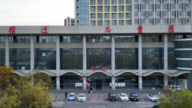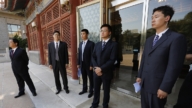【新唐人2011年11月24日訊】中國大城市上個月房產交易量同比下降39%,已跌到「危險的低水準」。目前中國銀監會還沒有發佈銀行貸款在房地產價量齊跌下的壓力測試結果,中國經濟學者綦彥臣認為,銀監會並沒有考慮到交易量下降和房價下跌,對銀行的抵押品和相關產業鏈的影響。
英國《金融時報》22號報導,根據中共當局公布的數據,10月份中國15個最大城市的房產交易量同比下降39%。全中國,10月房產交易量同比下降11.6%,降幅超過了9月份的7%。
分析師指出,原因很簡單:因為潛在置產者認定房價還會繼續下跌,所以他們寧願持幣觀望。加上房地產交易量下降已經影響到開發商的現金流,在某些情況下,還影響到他們償還銀行貸款的能力。
中國經濟學者綦彥臣則認為,一旦中國房地產業陷入蕭條,和房產相關的產業鏈,尤其是水泥和鋼鐵等都會受到拖纍,而造成中國銀行金融系統的壓力過大。
中國經濟學者綦彥臣:「水泥和鋼筋產業,如果房地產價格下挫以後,這兩個相關的產業要受到影響,這兩個產業的運行也是基本靠銀行貸,款寬鬆貨幣政策支撐起來的,所以中國房地產下挫了,房地產開發商沒能力支付鋼筋生產商,沒能力支付水泥供應商,這代表這兩個分支產業還款能力也下降了。」
國際貨幣基金組織(IMF)稍早針對中國17家大型銀行進行壓力測試,並在11月16號發佈評估報告,結果發現中國銀行業存在一定的脆弱性,無法一次面臨多種壓力衝擊,國際貨幣基金組織提出警告,由於銀行業借貸活動太過氾濫,中國銀行面臨系統性的風險升高。
對此,綦彥臣認為,從國際貨幣基金組織的報告可以看出,中國銀行和金融系統的脆弱性正逐漸增加。
綦彥臣:「為甚麼說脆弱性增加? 就是大量的銀行信貸資金被房地產這個行業套住,中國社會方面的融資情況、融資秩序會越來越壞,甚至可能引爆一些大規模的社會事件,(比方)高利貸,房地產市場不僅僅是拿到銀行的貸款,而且他相當一部分,是來自於民間的資金,比方說,你我的存款,經過好朋友投到房地產商這邊去了,所以現在跑路的老闆不僅僅是那些生產鞋帽這些實體,而且還有許多房地產商。」
今年4月,中國銀監會要求各銀行按照房價下跌50%、交易量下降30%的情形,對各自的貸款帳簿進行壓力測試。截至目前,中國銀監會還沒有發佈壓力測試結果,並拒絕置評。綦彥臣指出,這涉及中國官方經濟數據不透明的慣性。
中國經濟學者 綦彥臣:「這是中國政府管理經濟的一種習慣,中國金融是國家壟斷,沒有民間介入這個東西(概念),即便有好多擔保公司,他(中國銀監會)也沒有能力測算這個東西(壓力測試)。」
房地產建設在中國經濟中所佔比重超過13%,儘管北京一直在試圖遏制高漲的房價,綦彥臣認為,中國房地產行業正在下行階段,房地產泡沫正在破滅,部分一線城市,例如京滬等地的房價恐怕還會下落。
新唐人記者梁欣、林平、王明宇採訪報導。
Drastic Decline in Property Transactions Raises Risk in Other Business
Last month property transactions in Chinese cities
were down 39%, a “dangerously low level."
The China Banking Regulatory Commission has yet to
release the stress test results of declined bank loans and housing prices.
Economist Qi Yanchen believes that it is because the
Banking Regulatory Commission neglects to consider the impact that
decreased bank loan volumes and housing prices would have
on collateral and other bank related businesses.
The UK “Financial Times" reported on the 22nd, “In October,
however, property transactions fell 39% year-on-year in
China』s 15 biggest cities, according to government data.
Nationwide, transactions dropped 11.6 per cent,
accelerating from a 7 per cent fall in September."
It was analyzed that, “The fall-off in transactions has
affected developers』 cash flows and, in some cases, their ability to repay bank loans."
Chinese economist Qi Yanchen Qi believes that
once the Chinese property industry falls into a depression,
related industrial chains, especially cement and steel will suffer.
Consequently, the pressure on the Chinese banks
will be overwhelmingly large.
Chinese economist Chen Qi Yan: “Cement and steel will be
the two industries suffering from the declined property values.
The operation of these two industries basically relies on
bank loans and a loose monetary policy.
Therefore, with the declined property industry,
the developers won』t be able to afford the steel, and
the cement manufacturers can not afford to pay suppliers;
which represents the pay back ability of these two branches has also declined."
International Monetary Fund (IMF) earlier conducted stress
tests of the largest 17 commercial banks and released its evaluation report on November 16.
It reported, “China confronts a steady buildup of
financial sector vulnerabilities," and “If several of these risks were to occur at the same time,
however, the banking system could be severely impacted."
IMF warned of domestic risks due to “the rise of off-balance
sheet exposures and of lending outside of the formal banking sector."
Qi Yanchen believes that the IMF report showed the
Chinese banks and financial system are increasingly vulnerable.
Qi Yanchen: “Why is the vulnerability increased?
It is because a lot of bank credit money is trapped by the real estate industry.
The finance and financing order in the Chinese society are
getting worse and may even set off a number of large-scale social incidents, (for example) usury.
The real estate market will not just get a bank loan,
but also considerable amount of private funds,
for example, the savings from you and me might
have been invested in real estate through a good friend.
Therefore, nowadays it』s not just the manufacturer of shoes
who would run away, but also the many real estate businessmen."
FT indicated, “In April the CBRC told banks to test
their loan books against a 50 per cent fall in prices, and also a 30 per cent fall in transaction volumes."
Up to now, CBRC has yet to release the results or comment.
Qi Yanchen pointed out that this is just a custom of the
opaque official economic data of the regime.
Chinese economist Qi Yanchen: “This is the managerial habit
of the Chinese government. The Chinese finance is state monopolized.
There is no such a thing as civic involvement, even though
there are many security companies, the CBRC is not capable of doing the evaluation (stress tests)."
Real estate construction shares are up 13% in China’s economy,
although Beijing has been trying to curb the rising prices.
Qi Yanchen believes that China’s real estate industry
is going down and the real estate bubble is bursting,
in some first-tier cities such as Beijing and Shanghai,
property prices will probably continue to fall.
NTD reporters Liang xin, Lin Ping and Wang Mingyu.



























